
Senior Railcard
Encyclopedia
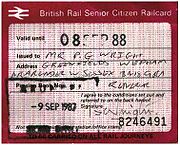






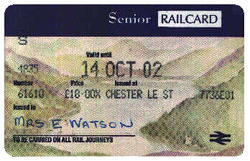
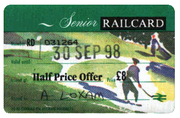
Rail transport in Great Britain
The railway system in Great Britain is the oldest in the world, with the world's first locomotive-hauled public railway opening in 1825. As of 2010, it consists of of standard gauge lines , of which are electrified. These lines range from single to double, triple, quadruple track and up to twelve...
. The Railcard has existed in various forms since 1975; the current version is priced at £
Pound sterling
The pound sterling , commonly called the pound, is the official currency of the United Kingdom, its Crown Dependencies and the British Overseas Territories of South Georgia and the South Sandwich Islands, British Antarctic Territory and Tristan da Cunha. It is subdivided into 100 pence...
26.00 and is valid for one year, with a 3-year card available for £65. It is one of a wide variety of discounted and concessionary fare schemes
Concessionary fares on the British railway network
In addition to the large number and variety of short-term or localised promotional fares that have been available to passengers on the British railway network in recent decades , there are many permanent concessionary fare schemes available to passengers...
available on Britain's railway network.
History
During the early 1970s, some of British Rail's Regions offered a series of small, localised travel promotions for people of or near retirement age. The London Midland and SouthernSouthern Region of British Railways
The Southern Region was a region of British Railways from 1948. The region ceased to be an operating unit in its own right in the 1980s and was wound up at the end of 1992. The region covered south London, southern England and the south coast, including the busy commuter belt areas of Kent, Sussex...
regions were particularly active in this, although other examples existed elsewhere. These promotions were characterised by restricted validity and geographical availability. For example, one Southern Region scheme introduced in 1970 offered pensioners half-price travel at off-peak times on Tuesdays, Wednesdays and Thursdays only, for journeys from a set list of around twenty stations, upon production of their pension book (to confirm their eligibility).
All of these schemes were superseded by the introduction of the first Senior Citizen Railcard (as it was then known), valid throughout Britain, on 1 April 1975. This took the form of a large, thin card (British Rail form number BR 24889) with a pre-printed expiry date of 31 March 1976 (so Railcards issued later in 1975 were valid for less than a full year), on which the holder's name, address, pension book number and signature had to be added. Holders had to meet one of the following criteria:
- Retirement pension book held; or
- Resident in United Kingdom with a pension received from another country; or
- No pension received, but aged over 65 and resident in United Kingdom.
The discounts available were relatively limited in relation to those available with the current Railcard:
- Half price travel on Tuesdays, Wednesdays and Thursdays only, in Second Class accommodation only; all Ordinary Single/Return and Day Single/Return fares were included
- 25% discounts on some SealinkSealinkSealink was a ferry company based in the United Kingdom from 1970 to 1984, operating services to France, Belgium, the Netherlands, Channel Islands, Isle of Wight and Ireland....
ferry services, operated at the time by British Rail
At first, the Railcard cost £4.32 (£4.00 + 8% value added tax
Value added tax
A value added tax or value-added tax is a form of consumption tax. From the perspective of the buyer, it is a tax on the purchase price. From that of the seller, it is a tax only on the "value added" to a product, material or service, from an accounting point of view, by this stage of its...
charge), although this was soon reduced to £4.00 when the VAT charge was removed.
A major change occurred as from 1 April 1976. A separate "Day Returns Only" Railcard, priced at £3.00, was introduced alongside the original Railcard, whose price was raised to £6.00. The cheaper Railcard gave discounts only on Day Return tickets—not on any Singles or Ordinary (Period) Returns. From the same date, two major enhancements were made, both of which applied to both types of Railcard: discounted travel could take place on any day of the week, and First Class travel gained the same discounts as Second Class. Also, a 50% discount was now given on Sealink ferry services to all destinations.
In the next few years, until the next major revision in 1985, the main changes to the Railcards' conditions related to the qualification criteria. From January 1978, these were extended slightly, with people aged 60 or over who received Widow's Pension
Widow's pension
A widow's pension is a payment from the government of a country to a person whose spouse has died.Generally, such payments are made to a widow whose late spouse has satisfied the country's requirements, including contribution, cohabitation, and length of marriage.-United States:In the United...
s or War Widow's Pensions being included. From January 1980, anybody resident in Britain and aged at least 60 (for women) or 65 (for men), and British people living abroad but meeting these age criteria, could buy the Railcard. Finally, from 30 March 1984, a further simplification took place: anybody aged 60 or over could hold one. This condition still applies as of 2007. Other additions included the introduction of certain discounts on Motorail services, London Underground
London Underground
The London Underground is a rapid transit system serving a large part of Greater London and some parts of Buckinghamshire, Hertfordshire and Essex in England...
journeys (these were charged at child rate for Railcard holders), through travel to the Isle of Man
Isle of Man
The Isle of Man , otherwise known simply as Mann , is a self-governing British Crown Dependency, located in the Irish Sea between the islands of Great Britain and Ireland, within the British Isles. The head of state is Queen Elizabeth II, who holds the title of Lord of Mann. The Lord of Mann is...
and various European destinations, and discounts on all-inclusive holidays by rail.
12 May 1985 saw changes to the range of fares which received discounts, and in some cases to the level of the discounts, in respect of the "full" version of the Railcard (which by now cost £12.00). The "Day Returns Only" Railcard still gave 50% discounts on those fares, but the full version now gave only a 34% saving on Standard Single and Return fares and the new off-peak Saver tickets. ("Standard" was the new name for the former "Ordinary" category of ticket, being the highest priced and least restricted. These are now known as "Open" tickets.) A 50% discount was now only available on Day Returns and the new off-peak equivalent, the Cheap Day Return. Further restrictions on journeys by ferry and ship were made in 1985 and 1986, while Rover and Ranger tickets of all types ("go-anywhere" multi-journey tickets covering particular geographic areas) were included within the discount scheme from May 1987, with a saving of 34% available for Railcard holders.
By this time, the "Day Returns Only" card could only be used to buy Cheap Day Returns, following the introduction of the "Cheap Day" fare to distinguish between peak-time and off-peak journeys. "Cheap Day Returns Only" wording began to appear on these Railcards accordingly; but they were withdrawn from 10 January 1988, with the price of the "full" Railcard being increased from £12.00 to £15.00 at the same time. The APTIS
APTIS
APTIS was the Accountancy and Passenger Ticket Issuing System used on Rail transport in Great Britain until 2007.It was widely known as the All-Purpose Ticket-Issuing System, a description which was used during the development of the...
ticket issuing system had been introduced in late 1986, and was still in the process of being rolled out across the British Rail network in 1988, so the APTIS "Cheap Day Returns Only" Railcard (form number BR 4599/18) is rarely seen. The first APTIS version of the full Railcard (BR 4599/17), with mauve
Mauve
Mauve is a pale lavender-lilac color, one of many in the range of purples. The color mauve is named after the mallow flower....
upper and lower bands, also lasted until 10 January 1988, at which point the following changes were made: security background (miniature repeats of the words "British Rail") was changed from the light green colour seen on most APTIS ticket stock to a dark pink; the upper and lower bands became dark brown; and part of the background was filled with the words "Senior Citizen Railcard" in cursive writing
Cursive
Cursive, also known as joined-up writing, joint writing, or running writing, is any style of handwriting in which the symbols of the language are written in a simplified and/or flowing manner, generally for the purpose of making writing easier or faster...
in white. This style lasted only until October 1988, at which point the white lettering changed to brown.
The Railcard was renamed Senior Railcard in May 1990.
From 5 January 1992, several changes were made to the discounts available. Reduced fares for journeys wholly on the London Underground network were withdrawn; children accompanying the Railcard holder no longer travelled for a £1.00 flat fare (see here); Day Singles and Day Returns for weekday journeys within the Network SouthEast area no longer received a discount, restricting Railcard holders to off-peak travel; and One Day Travelcard discounts became more restricted. From 1985, when the "One Day Capitalcard" (as it was then known) was introduced, Railcard holders gained a 50% discount. This applied from any Network SouthEast
Network SouthEast
Network SouthEast was one of three passenger sectors of British Rail created in 1982. NSE principally operated commuter trains in the London area and inter-urban services in densely populated South East England, although the network reached as far west as Exeter...
station either within or outside the Travelcard zonal area, and for Capitalcards valid for any combination of zones. The discount on "All Zones" Travelcards was reduced to 34% on 6 January 1991, although other zonal combinations still attracted a 50% discount. As from 5 January 1992, however, only the All Zones One Day Travelcard received any discount. (The level was maintained at 34%.)
There have been few significant changes since then, with frequent changes in the design of the Railcard being the most noticeable. On all types of ticket for which a discount is available, the level is 34%, as it has been since the changes of 1992; and the types of tickets which receive discounts remains largely the same. The discount is also available on most new ticket types introduced since then, such as SuperAdvance and Virgin Value
Virgin Trains
Virgin Trains is a train operating company in the United Kingdom. It operates long-distance passenger services on the West Coast Main Line between London, the West Midlands, North West England, North Wales and Scotland...
. Similarly, there has been little change in the types of ticket excluded from receiving discounts; these are summarised here. The restriction on journeys made in the morning peak in the former Network SouthEast area (now known as the "London and South East area") also remains.
Applications
Railcards can be booked at railway stations, Rail Appointed Travel Agencies and other ticket-issuing locations; through the post (only for Railcard renewals, not for first-time purchases); by telephone, through Train Operating Company telesales facilities; and online at a dedicated website accessible from ATOC'sAssociation of Train Operating Companies
The Association of Train Operating Companies is a body which represents 24 train operating companies that provide passenger railway services on the privatised British railway system. It owns the National Rail brand. The Association is an unincorporated association owned by its members...
central "Railcards" website. Some local authorities offer the cards at a discount of around 20% (see below - Related Schemes).
In the early years, applications could only be made in person at stations and travel agencies. Because applicants were required to hold a pension book or similar, this had to presented at the time the Railcard was purchased; the pension book number was then written on the front of the Railcard. Now, when a Railcard is bought in person, applicants must complete the form found inside the Senior Railcard leaflet available from ticket sales points and show proof of age. Online purchase requires registration using a valid e-mail address and password, and a UK passport
Passport
A passport is a document, issued by a national government, which certifies, for the purpose of international travel, the identity and nationality of its holder. The elements of identity are name, date of birth, sex, and place of birth....
or driving licence number for identification. Renewal of Railcards by post became possible in 1989; an agency based at Harrington Dock in Liverpool
Liverpool
Liverpool is a city and metropolitan borough of Merseyside, England, along the eastern side of the Mersey Estuary. It was founded as a borough in 1207 and was granted city status in 1880...
deals with all applications. During the period when the APTIS system was in use, this office had a single machine which validated Railcards with the location name MERSEYRAIL LPOOL and National Location Code
National Location Code
In the context of the ticketing system of the British railway network, a National Location Code is a four-digit code allocated to every railway station and railway ticket issuing point in Great Britain. NLCs are used in the issue of tickets, and for accounting purposes...
2202. (One such ticket is shown here.)
Price
The price of the "full" Railcard has been increased on several occasions since 1975. The shorter-lived "Day Returns Only" (and, later, "Cheap Day Returns Only") version also experienced regular increases.| Effective from | "Full" railcard |
"Cheap Day Returns only" railcard |
Notes |
|---|---|---|---|
| 1 April 1975 | £4.32 | N/A | Included VAT Value added tax A value added tax or value-added tax is a form of consumption tax. From the perspective of the buyer, it is a tax on the purchase price. From that of the seller, it is a tax only on the "value added" to a product, material or service, from an accounting point of view, by this stage of its... @ 8% |
| Later in 1975 | £4.00 | N/A | VAT charge dropped |
| 1 April 1976 | £6.00 | £3.00 | |
| 8 January 1978 | £7.00 | £3.50 | |
| May 1979 | £8.00 | £4.00 | |
| 28 January 1980 | £10.00 | £5.00 | |
| 19 June 1983 | £12.00 | £7.00 | |
| 10 January 1988 | £15.00 | N/A | "Cheap Day Returns only" card withdrawn |
| 7 January 1990 | £16.00 | N/A | |
| 17 August 1997 | £18.00 | N/A | |
| May 2004 | £20.00 | N/A | |
| 2 January 2008 | £24.00 | N/A | |
| Current | £26.00 | N/A | |
Tickets issued with a Railcard


APTIS
APTIS was the Accountancy and Passenger Ticket Issuing System used on Rail transport in Great Britain until 2007.It was widely known as the All-Purpose Ticket-Issuing System, a description which was used during the development of the...
, PORTIS/SPORTIS
PORTIS/SPORTIS
PORTIS and latterly SPORTIS were portable ticket issuing systems used on Rail transport in Great Britain until 2006...
and other computerised ticket issuing systems, a "status code" field is provided on each ticket issued. This is left blank if an adult is travelling at full (undiscounted) fare; but if any discount or other special condition applies, a code of up to five letters appears.
When APTIS and PORTIS (the predecessor of SPORTIS) were introduced, from late 1986, the Railcard was named "Senior Citizen Railcard", and a status code of SNRCZ was used to identify a ticket bought with the Railcard. Following the renaming to "Senior Railcard" in January 1992, this was changed to SNR. The two codes were used alongside each other during the period in which both "Senior Citizen Railcards" and "Senior Railcards" were in circulation. The code SNR has been used exclusively ever since, including on the various "New Generation" systems that have replaced APTIS and SPORTIS.
Accompanying children

On the APTIS
APTIS
APTIS was the Accountancy and Passenger Ticket Issuing System used on Rail transport in Great Britain until 2007.It was widely known as the All-Purpose Ticket-Issuing System, a description which was used during the development of the...
and PORTIS/SPORTIS
PORTIS/SPORTIS
PORTIS and latterly SPORTIS were portable ticket issuing systems used on Rail transport in Great Britain until 2006...
ticket issuing systems, the status code CHSNC was used to denote a child travelling with a Senior Citizen Railcard holder.
Related schemes
There have been, and continue to be, many variations on the standard Railcard; and as well as the regular discounts, various short-term or seasonal offers have been available to Railcard holders.Local authorities
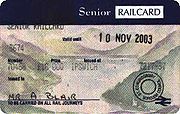
Local government
Local government refers collectively to administrative authorities over areas that are smaller than a state.The term is used to contrast with offices at nation-state level, which are referred to as the central government, national government, or federal government...
, such as Borough Councils and District Councils, either provide discounted Railcards to residents or offer their own area-specific version. The latter is unusual, although examples are known from the 1980s from the former Beverley Borough Council
Beverley (borough)
Beverley was a local government district and borough of Humberside, England, from 1974 to 1996.It was formed on 1 April 1974 by the merger of the previous borough of Beverley, with Beverley Rural District and Haltemprice Urban District...
and Lancashire County Council
Lancashire County Council
Lancashire County Council is the upper-tier local authority for the non-metropolitan county of Lancashire, England. It currently consists of 84 councillors, and is controlled by the Conservative Party, who won control of the council in the local council elections in June 2009, ending 28 years of...
, both valid on rail services only in those areas. It is more common for local authorities to offer residents the full Railcard at a reduced price (or even free of charge). Examples from around England include:
- Broadland District Council, Norfolk: £18.00; sent by post after completing online application form
- Congleton Borough Council, Cheshire: £15.00; available from any of five Council offices.
- Herefordshire Coounty Council £17:00 from the Council's Info Shops.
- South Gloucestershire £16:00 from council offices and other places.
- West Lancashire District Council free; available from Council offices.
Such tickets are issued in bulk at a local station's ticket office or at a travel agency, and are endorsed with the council's details. The full price, rather than the price the resident pays, is usually shown.
Promotional discounted Railcards

The television listings magazine TV Times
TV Times
TVTimes is a television listings magazine published in the United Kingdom by IPC Media, a subsidiary of Time Warner. It is known for its access to television actors and their programmes. In 2006 it was refreshed for a more modern look, increasing its emphasis on big star interviews and soaps...
is known to have offered reduced-rate Railcards to its readers for periods of approximately one month in 1989, 1990, 1991 and 1997. The 1990 and 1991 promotions were run in January and offered a £6.00 reduction in the purchase price, while in 1997 an £8.00 reduction (equivalent to 50%) applied between late August and late September. Tickets were issued in bulk at the Harrington Dock agency in Liverpool, as illustrated, and showed a blank "Price".
Free Railcards with short validity periods, designed to attract potential Railcard users who may not have considered buying one, have been given away with jars of Horlicks
Horlicks
Horlicks is the name of a company and of a malted milk hot drink. It is manufactured by GlaxoSmithKline in the United Kingdom, South Africa, New Zealand, Bangladesh, India, Pakistan and Jamaica, and under licence in the Philippines and Malaysia....
malted milk powder (spring 1998), on the cover of "Active Life" magazine—a general-interest publication aimed at over-50s (March/April 1998 edition), by the charity Help the Aged
Help the Aged
Help the Aged was a United Kingdom based, international charity, founded in 1961 by Cecil Jackson-Cole, to free disadvantaged older people from poverty, isolation and neglect. It merged with Age Concern in 2009 to form Age UK.-Organisation and campaigns:...
(June 1998), and with "Saga Magazine"—similar to "Active Life" magazine, produced by the British organisation Saga (1999–2000).
Free and reduced fares

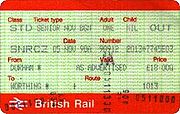

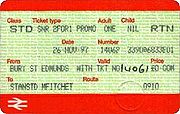
- Flat-fare "Go anywhere" tickets valid on Mondays to Thursdays inclusive, in November 1980, 1981 and 1982 and March 1981 and 1982.
- 50% discounts for accompanying adults throughout May 1983, in part of British Rail's Eastern RegionEastern Region of British RailwaysThe Eastern Region was a region of British Railways from 1948. The region ceased to be an operating unit in its own right in the 1980s and was wound up at the end of 1992...
. - Off-peak "Go anywhere" flat-fare tickets in the "London & South East" area (the predecessor of Network SouthEastNetwork SouthEastNetwork SouthEast was one of three passenger sectors of British Rail created in 1982. NSE principally operated commuter trains in the London area and inter-urban services in densely populated South East England, although the network reached as far west as Exeter...
) in November 1983; four accompanying children travelled for £1.00, as could one dog. Fridays were excluded. - Off-peak flat-fare (£2.00) point-to-point tickets within various large areas (Scotland, Wales, Cornwall and the "London & South East" zone) in November 1984; singles were available any day, and returns were sold on all days except Fridays. There were no child discounts, but one dog could accompany the senior citizen for £1.00.
- During each November from 1985 to 1990 inclusive, and in November 1995, Saver return tickets were available at a range of flat rates, offering substantial discounts (generally over 50%) on the full fare. These were marketed, and shown on tickets, under various names, such as Senior Citizen Promotion and Senior November Bargain. Children and dogs received flat-rate discounts until 1988.
- During spring 1988, First Class travel was available at the Standard Class price on Saver-rate fares.
- For three weeks from 27 April 1992, and again from 1 March 1994 to 27 March 1994, a 50% discount (instead of 34%) was offered for holders of the new, post-January 1992 Railcard on Saver, Supersaver and Awaybreak fares.
- In November 1994, off-peak returns on the Valley LinesValley LinesValleys & Cardiff Local Routes is the busy network of passenger suburban railway services radiating from Cardiff, Wales. It includes lines within the city itself, the Vale of Glamorgan and the South Wales Valleys....
network in Wales were priced at a flat rate of £1.00. - During March 1995, for journeys between Brighton and Bournemouth (and intermediately), 50% discounts were available for the Railcard holder and an accompanying passenger.
- The discount was increased to 50% across all ticket types between 1 May 1995 and 14 May 1995 to celebrate the 50th anniversary of Victory in Europe DayVictory in Europe DayVictory in Europe Day commemorates 8 May 1945 , the date when the World War II Allies formally accepted the unconditional surrender of the armed forces of Nazi Germany and the end of Adolf Hitler's Third Reich. The formal surrender of the occupying German forces in the Channel Islands was not...
(VE-Day). - Heavily discounted sleeper train berthsSleeping carThe sleeping car or sleeper is a railway/railroad passenger car that can accommodate all its passengers in beds of one kind or another, primarily for the purpose of making nighttime travel more restful. The first such cars saw sporadic use on American railroads in the 1830s and could be configured...
in summer 1995. - £10.00 return tickets for the Railcard holder and an accompanying adult between any two stations in Britain between 25 January 1997 and 26 March 1997; obtainable by post or telephone only.
- Flat-fare (£8.00) tickets between any two destinations in Scotland in February 1997.
- Between 4 November and 14 December 1997, "two for one" off-peak tickets of various types for outward travel on Tuesdays and Wednesdays. This offer was backed by widespread magazine advertising.
- In June 1998, and again in March 1999, £7.50 returns between any two First Great Western stations, with tickets also being valid on any other train operator running in the same area. These were run in conjunction with campaigns by Help the Aged. A third such campaign was run in June 2000, with the price of the tickets having risen to £10.00.
Other offers
- In January and February 1995, in conjunction with British Rail, Post Office Ltd.Post Office Ltd.Post Office Ltd is a retail post office company in the United Kingdom that provides a wide range of products including postage stamps and banking to the public through its nationwide network of post office branches.-Structure:Post Office Ltd...
sent leaflets to households across the MidlandsEnglish MidlandsThe Midlands, or the English Midlands, is the traditional name for the area comprising central England that broadly corresponds to the early medieval Kingdom of Mercia. It borders Southern England, Northern England, East Anglia and Wales. Its largest city is Birmingham, and it was an important...
with a voucher giving £1.00 off the purchase price of a Railcard. - In September 1998, leaflets were distributed with various newspapers and magazines featuring vouchers for 50% off any rail ticket for anybody who bought a Railcard for the first time.
- In October 1998, the Women's InstituteWomen's Institutes (British)The Women’s Institute is a British, community-based organisation for women. It was formed in 1915 with two clear aims: to revitalise rural communities and to encourage women to become more involved in producing food during the First World War. Since then the organisation's aims have broadened and...
Home and Country Magazine included a voucher for a Senior Railcard valid for 15 months instead of the usual 12, for first-time buyers. - Between December 1998 and January 1999, 110,000 prospective Railcard holders were sent vouchers for a free bottle of 50-year-old amontilladoAmontilladoAmontillado is a variety of sherry, characterized by being darker than fino but lighter than oloroso. It is named for the Montilla region of Spain, where the style originated in the 18th century, although the name 'amontillado' is sometimes used commercially as a simple measure of colour to label...
and £1.00 a bottle of ordinary sherrySherrySherry is a fortified wine made from white grapes that are grown near the town of Jerez , Spain. In Spanish, it is called vino de Jerez....
, if a Railcard was bought. - British travel firm First Choice Holidays PLC offered £50.00 off a single-person package holidayPackage holidayA package holiday or package tour consists of transport and accommodation advertised and sold together by a vendor known as a tour operator. Other services may be provided like a rental car, activities or outings during the holiday. Transport can be via charter airline to a foreign country...
in exchange for two different rail tickets issued with a Senior Railcard, or £100.00 off a multi-person holiday in exchange for four tickets, in a short-term promotion that began on 15 February 1999. - The War Widows Association, an organisation working to improve living conditions for war widows and widowers in Britain, operated a marketing campaign in June 1999 which included vouchers for £6.00 off the price of a Railcard.
- For four weeks from 8 April 2000, a senior citizen buying a Railcard by telephone could order one free of charge for another person, subject to proof of entitlement being given.
Popularity
Many millions of Senior Citizen and Senior Railcards have been sold since 1975. A written reply to a question in the House of CommonsBritish House of Commons
The House of Commons is the lower house of the Parliament of the United Kingdom, which also comprises the Sovereign and the House of Lords . Both Commons and Lords meet in the Palace of Westminster. The Commons is a democratically elected body, consisting of 650 members , who are known as Members...
on 8 December 1998 revealed that between the 1990/1991 and 1997/1998 financial years inclusive, 5,569,842 Railcards had been issued, with the highest annual total in that period being 930,393 in 1990/1991. Data from before 1990 was said to be unavailable.
External links
- Railcards website
- Senior Railcard website
- Senior Railcards on HubPagesHubPagesHubPages is a website designed around sharing advertising revenue for user-generated articles and other content on specific subjects.- History :...

